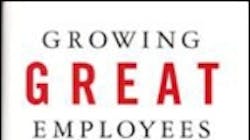Innovation From The Ground Up
Over the past twenty years there's been a revolution in the manufacturing sector of American business. The simple factories of previous generations are largely gone, replaced by facilities our grandparents would barely recognize. Ever-increasing consumer expectation for innovation, speed and quality have led to ever-decreasing cycle times and error rates and more exacting and complex technological specifications. All of these factors put manufacturing organizations on the leading edge of the search for sustainable competitive advantage. New systems and processes are being tried every day: ways to structure how work gets done, how supply chains are managed, how products get developed. It's a continual race to be fastest, cheapest and best.
In her new book, Growing Great Employees: Turning Ordinary People into Extraordinary Performers, Erika Andersen suggests that we may be underestimating one source of competitive advantage that's available today in every business: the commitment and creativity of our workers. She believes that we can tap into this resource much more effectively simply by managing our people better.
IndustryWeek posed a few questions based on the principles discussed in the book.
Q: Most people seem to think that innovation happens when you make special creativity-boosting efforts with workers. What does good management have to do with employees being more innovative?
A: Special efforts aren't a bad thing -- but in my experience, employees tend to be most innovative when they feel reasonably sure that nothing bad will happen to them as a result of having and expressing fresh ideas, and that, in fact, they might even be supported and encouraged for it! Skillful managers create the kind of environment that provides this invitation to innovate.
First, such managers interview to find people who can generate and implement new and better ways of doing things. They also let people know very clearly, once they're hired, how they'll be incented and rewarded for this kind of behavior: innovation-supportive managers make clear performance agreements with their employees about the good things that can happen for folks who innovate.
Then, on a day-to-day basis, they practice what they've preached: they genuinely listen to people's ideas; ask curiosity-based questions to flesh out their employees' insights; share credit -- publicly -- if those ideas bear fruit. And if an idea doesn't work out, they don't punish or blame the person who came up with it; they involve that person in discussions about what went wrong or why it didn't pan out, focused on coming up with even better ideas next time.
One of our clients, a Fortune 100 consumer products company, routinely posts brief stories on the company intranet about employee ideas and how they've been implemented. These stories are contributed by the employee's manager; both manager and employee are eligible for "innovation bonuses" based on the impact of their idea on the organization.
A: Most managers in manufacturing are good at the technical aspects of the job -- and they're usually good at managing people to complete those aspects of the job: they're trained to monitor and hold people accountable to time and output.
However, most managers aren't given much training or help in the "human" side of management: how to support their employees' development, how to create strong teams, how to provide feedback and coaching to help employees improve, how to support creativity and innovation.
In working with a large multinational manufacturer of automation and power control products and services, to develop this kind of management training, and to build these responsibilities into the performance management system they are realizing how profoundly this will alter their culture: managers up till now have only been responsible for making sure the product got out the door, error-free, on-time. Now they're going to be held accountable for assuring that the company is really getting the best from its employees.
Q: That's taking on a lot -- what's in it for managers to manage like this?
A: It's like gardening, which is the metaphor I use throughout my book. If you put in a good amount of energy at the beginning -- preparing the soil, buying the right plants, getting them started right -- then all that's required is some fairly simple and consistent ongoing maintenance, and you'll be rewarded with a thriving and productive garden. It's the same with people management: if you attend to the important tasks at the beginning -- hiring the right people, putting them in the right jobs, getting them started right, and creating an open, honest environment that supports learning and innovation -- and then stay reasonably consistent in supporting them to grow, you'll be rewarded with a thriving and productive group of employees: skilled, motivated, loyal and appropriately creative.
Erika Anderson is the founder of Proteus International, an organizational development consulting and coaching firm that works with CEOs and top executives of many major corporations. More on this book can be found at www.growinggreatemployees.com
